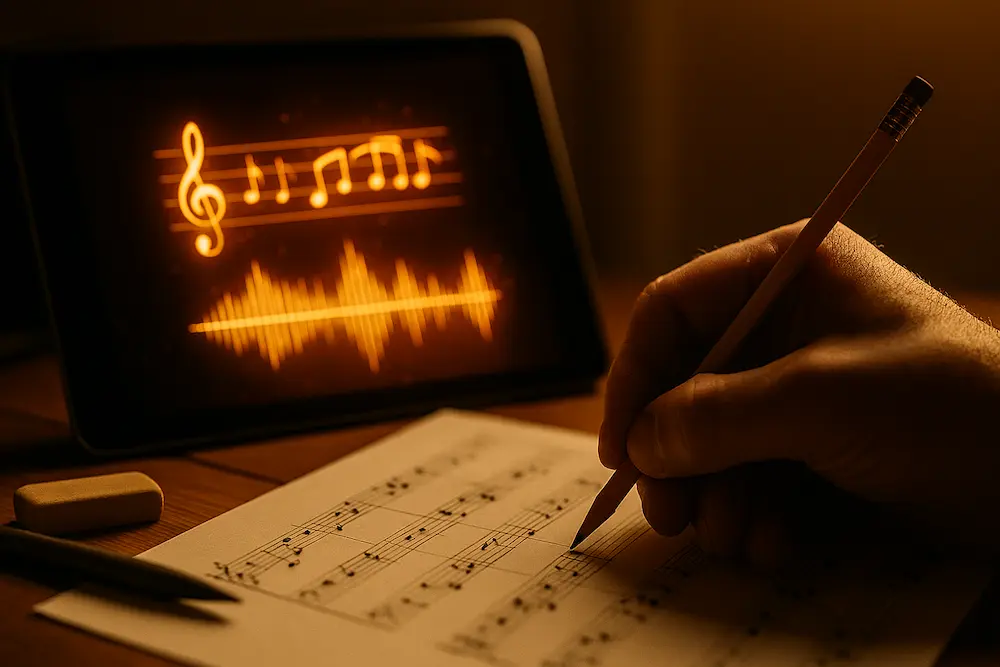Three North American PROs announced their alignment on AI registration rules. However, many songwriters are still hoping for clarity. The problem? The update feels like progress, but it's still wrapped in a lot of uncertainty.
by CountryDemoStudio Staff | November, 20, 2025.

For the past few years, songwriters have been stuck in a limbo created by rapidly evolving AI tools, slow-moving policymakers, and a Copyright Office that still refuses to recognize works created entirely by machines.
Performance Rights Organizations (PROs), such as ASCAP, BMI, and SOCAN, have often echoed that cautious position, leaving creators wondering where their AI-assisted songs fit into the system.
In late October, ASCAP, BMI, and SOCAN jointly announced that they will now accept registrations for partially AI-generated musical works. This means compositions that combine AI-generated musical ideas with human-authored elements, such as lyrics, melodies, arrangements, edits, and structural decisions, can usually be registered.
But there's a clear boundary:
According to the statement, the organizations believe AI can be a "powerful tool" for creators, but only when the human songwriter remains the actual author of the work. They also reaffirmed a vital point: using copyrighted music to train AI models without permission is not "fair use." In their words, it's theft. So even though they're willing to register specific AI-assisted works, they're signaling that creators still need to be careful about the tools they rely on.
SESAC has not yet published a public policy for songwriters regarding registering AI-assisted compositions. However, the organization has clearly taken a stance on AI training and copyright issues by supporting the Human Artistry Campaign and backing legislation that shields creators from unlicensed data scraping. Although no official guidance is available, SESAC seems philosophically aligned with ASCAP and BMI in prioritizing human authorship.
The policy closely mirrors the U.S. Copyright Office's stance:
In other words, nothing truly groundbreaking has changed. The PROs have not defined how much human contribution is "enough," nor have they clarified where the line falls between "AI-assisted" and "AI-generated." They've stated they will "welcome partially AI-generated works." That's a polite, industry-safe way of saying:
For writers who use AI as a brainstorming partner, such as generating melodic ideas, suggesting chord progressions, or offering rough lyrical prompts, this update is mostly good news.
Your song is still your song, and you can register it as long as:
But because the PROs haven't given a precise threshold, the safest practice is to ensure your human authorship is dominant and clearly documented.
This update is not permission to:
Songwriters must still exercise caution. Many AI models have been trained on copyrighted music without licenses. If a tool has unclear training data, that risk passes to the user, not the PRO.
If you plan to submit a song that used AI during the writing process, here's how to protect yourself:
Keep drafts, notes, voice memos, and version history showing how you shaped the song.
Don't rely on AI for entire verses, choruses, or melodies. Use it as a tool, not a ghostwriter.
Stick to tools that are transparent about training data and legally compliant.
You don't need to detail every tool you used, but make sure your authorship claims are truthful and defensible.
This announcement is a step forward, but it isn't the revolution many headlines suggest. ASCAP, BMI, and SOCAN haven't fully embraced AI music.
However, they've opened the door to musical works in which humans are clearly still in charge. AI can help you write, but you're still the author, and you must stay the author. And until the law becomes clearer, the safest approach is simple: let AI assist your creativity, but don't let it replace it.
📌 Pro Tip: In your PRO work registration, list only the human authors, and use the "notes" field if you want to explain that AI was used in production but not in authorship.
AI tools are transforming the way we write and produce music, but when it comes to publishing and performance royalties, human creativity remains the key differentiator.
👉 If you've written a song with AI help and want to make sure it's polished, protectable, and ready for the industry, our AI-to-Human Song Service can help. We take your AI-assisted ideas and transform them into professional, fully human-performed demos that you can confidently register, pitch, and protect.
Find the song demo style that fits your budget and your goals.
See Services